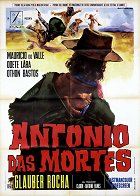
Regie:
Glauber RochaDrehbuch:
Glauber RochaKamera:
Affonso BeatoBesetzung:
Maurício do Valle, Odete Lara, Othon Bastos, Hugo Carvana, Jofre Soares, Lorival Pariz, Rosa Maria Penna, Emmanuel Cavalcanti, Vinícius SalvatoriInhalte(1)
In einem Dorf im Nordosten Brasiliens erscheint ein "Cangaceir" und gibt sich als Reinkarnation des berühmten Banditen Lampião aus. Antônio das Mortes, der gedungen wurde, das Böse in Gestalt der Cangaceiros und Propheten auszurotten, macht sich auf den Weg, ihn zu treffen. Es beginnt ein Duell zwischen dem "Drachen des Bösen" und dem "Heiligen Krieger". (Verleiher-Text)
(mehr)Kritiken (1)
The era of cangaceiros - the bandits of the sertao, the arid northeast of Brazil - has ended. It not ending because it has already ended: in the film, the characters move deliberately as if lifeless (the burned-out Antonio, whose raison d'être perished by his own hand; Coirana, who is merely a follower of a dead bandit tradition and in the film only literally dies from a certain point onwards; the blind old landowner, foolishly defending his property, a typical character of perverse dehumanizing greed against the green of life, etc.). Rocha can better build the brand of his work in this way: the intertwining of reality and myth, characters mythologizing themselves, the transformation of real misery into a mythical reflection, etc. Moreover, the intertwining of counterpoints is repeated in other narrative elements: in the mise-en-scène, for example, when Antonio and the bandit Coirana meet (a meeting so quick compared to Black God, White Devil..., where we waited for it the whole film), and in which the characters unexpectedly blend in one long shot, until suddenly they face each other, but also in the scenes when Antonio (dressed in early 20th-century clothing) stands amidst modern car traffic. Cars speeding by, indifferent to the characters of the movie. This is the main counterpoint and the main message of the film: the myth of cangaceiros is dead, times have changed; the myth of yesterday is not an inspiration, but precisely a juxtaposition with today. The struggle of today only comes when the last myth of yesterday dies and becomes just a memory, and only then can it strengthen those who are going in the same direction as he once did. This is the engaged message of the film, personified in the character of the "Professor": just like Antonio, he joins the side of the people only after Coirana's death. So, what does the awakening of the mercenary Antonio mean? In my opinion, it is a clear parallel to the situation in Brazil at that time and the rise and consolidation of the military junta in the late 1960s: Can't Antonio's awakening (the soldier) and his alignment with the Professor (Rocha's left-wing intellectual type) against the blind landowner serve as an appeal to the army to join the side of Brazilians and turn against the isolated bourgeois/landowning elite?
()